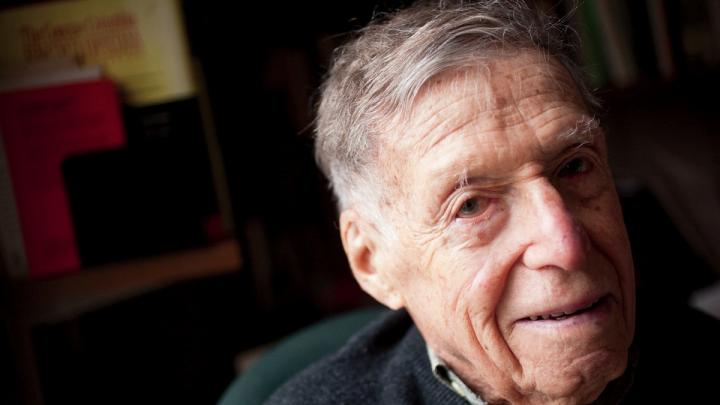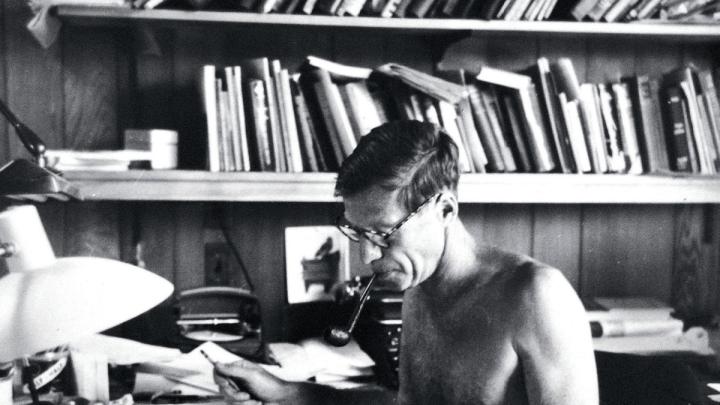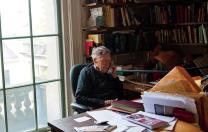I first met Daniel Aaron 23 years ago. He was almost 80 then, retired for several years from his professorship at Harvard: a lean, fit, cheerful man, with a sharp profile, his skin nearly matching the color of his still dark brown hair. “Dan,” as he would almost immediately ask you to call him, was on the faculty of the Stuttgart Seminar, a summer school devoted to international exchange. I knew I wanted to work with him. I had bought his Writers on the Left in London when I was student at University College, at my professor’s urgent recommendation. During all the years I had spent locked up in the dusty ivory tower of German academe, weaned on densely footnoted pseudo-profundities, I had never encountered anyone who wrote so clearly, so crisply, with such evident joy in the capacity of words to mean things: “American literature, for all its affirmative spirit, is the most searching and unabashed criticism of our national limitations that exists.” Here was the rationale—one I hadn’t been able to articulate so well to myself—for the field of study I had chosen more or less intuitively.
After the seminar, Dan stayed in touch, and as I write this sentence, I still feel a mixture of shock and elation that a man of such distinction would have made the effort to write to a newly minted German Ph.D. without real accomplishments or significant prospects. When I won a postdoctoral fellowship and told him I was planning to move to Canada for a year, he called and suggested I come to Harvard instead. “But I don’t know anyone there,” I said, mindful of the fact that he was officially retired. “You know me!” he said, in a voice that brooked no disagreement.
I had been studying American literature for years, but at Harvard, Dan helped me find my own place in that vast experiment of American culture that, as he never ceased to remind me, had been shaped as much by outsiders like me—people who never felt the “whoop of the PEEraries” in them, to quote Ezra Pound—as by American-bred boys like him. Dan also taught me to take responsibility for my writing. When I handed him an early version of a chapter I had just completed, adding that I wasn’t yet happy with it, he returned it right away: “I want to read it when you’re happy with it.”
Dan recently celebrated his 103rd birthday, and he did so in style: with the publication of a brand-new volume, Commonplace Book, 1934-2012 (Pressed Wafer). It is the summation of an extraordinary writing life that began when he started keeping a journal in his late teens. Born in Chicago to Russian-Jewish immigrants, he spent the first dozen years of his life in Los Angeles. After the deaths of both of his parents, he returned to the Midwest, attending high school in Chicago before enrolling, barely 17 years old, at the University of Michigan. Harvard was not his first choice for graduate school, but the University of London had imposed what he remembers as “time-consuming conditions.” And once Dan arrived in Cambridge, his gift for friendship quickly asserted itself, and he stayed. Widener Library, that hub of Harvard’s campus, helped: here Dan, set apart from other Harvard students by his name and origin, found his true intellectual home. In due course, he became the first “counselor” in the newly created program in American civilization at Harvard as well as the first recipient of a Ph.D. in that field, in 1943.
Yet, as Dan later realized, he had always lived at an angle to the American cultural landscape: from the west to the east, traveling the “course of the empire” in reverse, as he noted in his autobiography. His dissertation, on the development of Cincinnati, the “Queen City of the West,” between 1819 and 1838, characteristically challenged a central assumption of Frederick Jackson Turner’s famous “frontier thesis.” In his paean to the single-minded American pioneer, Turner had not distinguished the urban from the rural West and had failed to recognize the role that values such as mutual aid and cooperation had played in the formation of American society. Gripped by unshakable optimism, early Cincinnatians sailed through financial panics and natural disasters, their eyes firmly on the future, though they also forgot to plan, as Dan acidly added, “for the contingencies which always accompany social and economic progress.”
Some of the optimism in Dan’s dissertation carried over into the two groundbreaking books he completed during 30 years spent at Smith College, where he had gone in 1939. Men of Good Hope: A Story of American Progressives (1951) and Writers on the Left: Episodes in American Literary Communism (1961) addressed the efforts, “however blundering and ineffective,” of American writers from Ralph Waldo Emerson to Max Eastman to change the world. But the final volume in his great trilogy, The Unwritten War, completed after Dan had returned to Harvard as Thomas professor of English and American literature, presented the darker side of the country he loves: the dismal failure of a society enmeshed in racial hatreds to confront honestly, decently, and without sentimentality, the evil of slavery. In American literature, he wrote, the Civil War was “not so much unfelt as unfaced.” It did not free the slaves but trivialized them, reducing them to ciphers. Reading the book, his friend Ralph Ellison found plenty of material to support his theory of the black man’s enforced invisibility. The Unwritten War (where in the world did Dan always find such great titles?) was published in 1973, the year of Watergate. While Nixon, stumbling over the word “integrity,” assured the nation that he wasn’t a crook, Dan stared unflinchingly into what one of his favorite writers, the essayist John Jay Chapman, had once deemed the cold heart of America.
But it is also due to Dan’s scholarly work that the very notion of an American literature that, warts and all, needed to be studied, probed, and preserved came into being. The critic Edmund Wilson, with whom Dan had maintained a cautious friendship since the 1950s, had first floated the idea of a Great American Library, a series of classics of American literature to rival the editions of the French “Bibliothèque de la Pléiade.” The volumes, handsomely bound and edited according to the best scholarly principles but affordable enough to make it into the homes of ordinary readers, were not intended to enshrine what people already knew. As Dan recalls, Wilson was simply annoyed that so many writers he liked had gone out of print. Dan was perfectly suited to make Wilson’s dream an institutional reality. Never one to waste much time on critical orthodoxies but affable and diplomatic enough to garner wide-ranging support, he co-founded the Library of America in 1979. Dan’s all-encompassing reading interests, unimpeded by narrow definitions of what makes a text “literary,” manifest themselves to this day in the list of authors that the Library of America has published, from the familiar (Hawthorne, James, Melville) to the unexpected (John James Audubon, Pauline Kael, Reinhold Niebuhr, and anthologies of writings on food, environment, and baseball).
Never one to seek honors, the honors sought him. In 2007, Harvard made Dan an honorary doctor of letters, lauding him, appropriately, as a “man of good hope.” And in 2010, President Obama awarded him the National Humanities Medal. And yet Dan has never been an uncritical advocate of a country to which he has always felt he doesn’t unreservedly belong. In his intellectual memoir, titled, with considerable irony, The Americanist (2007), Dan meditated on his lifelong struggle to reconcile the warm, welcoming America to which, as an unrebellious child, he had once pledged allegiance, with that other, stranger place that had inevitably reared its head in the literature he has studied: a country shaped by mutual distrust, racial bigotry, and labor strife. But then, he had always known that it was there. In his Scrap Book (2014), a collection of his favorite grotesque newspaper clippings, Dan recalls being sent as a small boy to deliver a package to a terrifying neighbor, a retired judge. Sitting on his porch, the judge, tall, angular, and angry, watched Dan approach and then looked him up and down. Dan was wearing a kind of jumpsuit that day. “Boy,” the judge growled. “Why do your pants go up to your neck?” A weird figure to the boy, the judge had reminded Dan how strange he was. Dan would never forget him.
Dan likes strong views, and he likes them in other people, too. Occasionally, readers have felt confused by his apparent readiness to feel his way into the minds of people with viewpoints very different from his own. A case in point is the Atlanta-born poet manqué Arthur Inman (1895-1963), author of perhaps the largest diary ever kept by an American. Sequestered for the better part of his life in a curtain-shrouded apartment in Back Bay’s Garrison Hall, Inman paid scores of men and young women (he much preferred the latter) to come and share their life stories with him. His voluminous diaries, five decades of constant writing, throbbed with intimate details taken from other people’s lives: in the desires and troubles, the small triumphs and big defeats of his “talkers,” Arthur recognized himself. Their stories replenished the storehouse of his anguished mind. Arthur Inman was a voyeur, a monster, the epitome of a stunted soul, seething with paranoia and prejudice. A less benign version of Whitman’s noiseless spider, he flung out his filaments to see where they might catch and then he would reel his victims in. He admired Hitler and Mussolini, hated Jews, Mexicans, “Mediterraneans,” and African-Americans, humiliated his wife, and fondled the girls who came to see him. When Senator McCarthy died, he was upset. Arthur repulsed Dan, but he fascinated him, too. Commissioned by the Inman estate, Dan spent the better part of a decade condensing Arthur’s 17 million words into two hefty volumes, The Inman Diary, published by Harvard University Press in 1985.
In many ways, Commonplace Book is his long-overdue anti-Inman Diary, the book he needed to write to purge Arthur Inman’s spectral presence from his mind. Like Inman, Dan has been a life-long note-taker. But if Inman collected people’s narratives mainly for what they told him about himself, Dan gathers them for what they tell him about life in general. Typically, a commonplace book consists of the opinions, definitions, and sayings of others; it is, precisely, not a diary, and its purpose is not self-aggrandizement. Temperamentally averse to navel-gazing but constantly pressured by friends and colleagues to reveal more about himself, Dan has appropriated the genre and added a clever new twist. Instead of arranging his entries, as is customary, by topic, they appear chronologically, sorted according to the year in which he first wrote them down, amounting to a kind of unconventional autobiography. And wherever in these pages Dan’s own thoughts and experiences show up, he, too, becomes one of his commonplaces—the most common of all, in fact: “DA.”
Not unexpectedly, death is a constant presence in Commonplace Book, but not as something to be feared, as it certainly was for the hypochondriac Inman. “I should like to renew my friendship with the dead,” announced Dan in 1950, “to think of them frequently and to speak to them.” His book is the transcript of such friendly dialogues. His most frequent interlocutors are, significantly, non-American: the German Enlightenment wit Georg Christoph Lichtenberg, a hunchback physicist with a gift for subversive irony; the austere French poet-philosopher Paul Valéry, compiler of a grand intellectual diary he called Cahiers; and the melancholy Austrian novelist Robert Musil, creator of Ulrich, the “man without qualities,” a fictional character Dan has long admired. His own brand of humor is evident everywhere: in the definitions of bizarre words from “Daniel’s Dictionary,” in his trenchant characterizations of contemporaries such as Lillian Hellman and Norman Mailer [’43], and in the self-deprecatory poems (or “pomes,” as likes to call them, in honor of James Joyce) about old age. And who knew that Dan Aaron is a master of nonsense verse? “Relax and have no fear/ Here is Meyerbeer.”
Many entries in Commonplace Book deal with the subject of religion. Dan has always insisted that he is not a spiritual person, by a long shot. In The Americanist, he speaks proudly of the one and only epiphany of his life, which took place when, as a young man sitting on a log in the woods of upper Wisconsin, he watched the sun going down. The experience lasted all of five seconds. And yet Dan also told me that in college he assembled his own set of pragmatic household gods, each with its own specific function (there even was a God of Dating). He even built a primitive altar for them, offering sacrifices when and if needed. In Commonplace Book, he no longer entirely rules out the possibility that the world might be governed by something other than our appetites. One of the most extended vignettes, a “Story Idea” from 1978, involves an emeritus professor and owner of an old, moribund bike that miraculously fixes itself overnight and, exuding music and perfume in its rejuvenated state, convinces the professor to mend his atheist ways. But not so fast: in another vignette, the poem “Prayer” written in 1995, Dan survives a near-collision with a truck on Mount Auburn Street and thanks God for having saved him without requiring that he actually believe in Him.
In the book’s final pages, Dan, warily alert, registers his surprise at the many advantages life has bestowed upon him: “I didn’t think I could live this long.” Remembering, in one of the most poignant entries (“New Year’s Day, 2000”), a train ride he took with his family from Chicago to Los Angeles, he thinks of his life as just such a journey, with occasional stops—opportunities to look around and take in the scenery. But before this metaphor takes him too far, Dan imagines the end of that journey, too, on a wet and foggy night, when it is time to get off, suitcase in hand, and step across the empty platform. And now, turning around, looking back at all of us who haven’t arrived yet, Dan is smiling.










